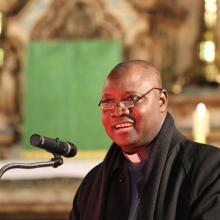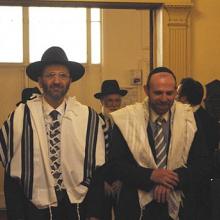Paris
Nigerian Roman Catholic Archbishop Ignatius Kaigama says his country needs a similar march to the one held in Paris on Jan. 11 to pay tribute to victims of Islamist militant attacks.
While 20 people were killed in the Paris rampage (including three terrorists), Boko Haram’s ongoing campaign of terror in Nigeria has left hundreds dead. Last week, as many as 2,000 were killed as Boko Haram militants took over the town of Baga in Borno state.
Kaigama said he wants the international community to show determination to stop the advance of militants, who are indiscriminately killing Christians and Muslims and bombing villages, towns, churches, and mosques.
“I hope even here a great demonstration of national unity will take place, to say no to the violence and find a solution to the problems plaguing Nigeria,” Kaigama told Fides, a Catholic news agency.
I love Jon Stewart. I mean, like “maybe jump the fence” love him. His presence on The Daily Show has spoken to and with my generation through some of our most formative years.
And yes, he tells fart jokes (which I also love). And yes, he editorializes, (which is nearly ubiquitous in “legitimate news” streams anyway). But he also often names what people are thinking, feeling, or what they can’t even put into words.
And then he helps us laugh about it, and at ourselves.
On a recent episode of The Daily Show, however, he took a more sober tone when talking about the slaughter in the headquarters of the French satire magazine, Charlie Hebdo. One comment in particular that he made stuck with me, not because it was funny or witty. Rather, it pointed to something we all need to consider more seriously, I think.
A horrific attack on a satirical magazine that mocked Islam left 12 people dead on Jan. 7 and put the Muslim community on edge.
The hunt is now on for the assailants, two or three masked men who witnesses and police say opened fire with automatic weapons inside the office of French weekly Charlie Hebdo.
“People are exploiting this one way or another,” said Fateh Kimouche, 38, the founder of Al Kanz, a prominent French Muslim blog.
“The terrorists didn’t distinguish what faith their victims were from. … I just found out that one of the cops killed, his name was Ahmed. Even Muslims aren’t safe.”
The three gunmen who attacked the magazine during an editorial meeting reportedly shouted “Allahu Akbar,” and described themselves as al-Qaida in Yemen. They killed prominent cartoonists, staff members and two police officers in what French officials described as a carefully planned and executed attack.
The French weekly has drawn the ire of Muslims before. Its offices were firebombed in 2011, after a spoof issue skewering Muhammad, the Muslim prophet. A year later, the magazine published crude caricatures of Muhammad, shown naked and in sexual poses. Most Muslims object to any depictions of the prophet, even if reverent.
Reaction — and condemnation — was swift.
Amid mounting protests in Europe against the Gaza conflict, political and religious leaders in the region have sharply denounced anti-Semitism within their borders.
“Anti-Semitic rhetoric and hostility against Jews, attacks on people of Jewish belief and synagogues have no place in our societies,” the foreign ministers of France, Germany, and Italy said in a statement Tuesday from Brussels.
Fears of escalating unrest are perhaps sharpest in France, home to Europe’s largest populations of Jews and Muslims. Many have roots in North Africa, and violence in the Middle East resonates strongly here. Thousands defied a government ban against Paris-area protests over the weekend, staging pro-Palestinian rallies that degenerated into violence.
IN FRANCE, about 70 percent of water services are privatized. French corporations continue to vie for control of the global water supply. But in 2010, Paris, in a case of “remunicipalization,” exited contracts with Paris-based Veolia and Suez Environnement, the world’s two largest water service companies.
Veolia is also the largest waste-water corporation in the world. Subsidiary Veolia Water North America is the largest private operator of U.S. municipal water and waste-water systems and controls the water service of about 14 million people.
The city of Jakarta, Indonesia, was recently confronted with a clean-water crisis as supplies run dry and a leaky system loses about 40 percent of its water. The city, with 10.9 million people, decided to buy back control of its water system in June from Suez Environnement.
Amid a finance scandal that touched the heart of France’s Socialist government, a quieter drama played out this month as the country’s top rabbi resigned his post after admitting to plagiarism.
Rabbi Gilles Bernheim offered his apologies for “borrowing” the work of others and lying about his academic credentials, ending a leadership crisis that has rocked the country’s 600,000-strong Jewish community, the largest in Europe.
Now, as the search begins for a new grand rabbi, questions are mounting about which direction the religious leadership will take — notably whether it will continue Bernheim’s move toward a more “modern” and perhaps more inclusive French Judaism, or return to a more inward-looking faith.




